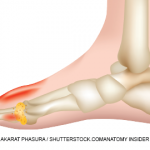New conditional recommendations compared with the 2012 guidelines include testing HLA-B*5801 in African Americans and patients of Southeast Asian descent before starting allopurinol, due to the higher prevalence of this gene in these populations, and against this test in all other gout patients.
A new conditional recommendation is for an augmented ULT protocol, including patient education and shared decision making, to be managed by a non-physician healthcare provider, such as a nurse, to optimize the patient’s treat-to-target strategy. Lifestyle management advice for all gout patients regardless of disease activity includes a conditional recommendation for limiting alcohol, purine and high-fructose corn syrup intake, and a conditional recommendation against adding vitamin C supplementation to therapy.
Clinical Scenarios
Co-investigators presented patient case examples to illustrate applications of the recommendations. Nicola Dalbeth, MBChB, MD, professor of medicine at the University of Auckland, New Zealand described a 54-year-old white man who presented to the clinic with an acute, painful gout flare in his left ankle and first metatarsophalangeal joint. He’d had three previous gout flares, the first one at age 50, but no other flares in the past year. On presentation to his provider, he had new-onset difficulty with walking due to severe pain and no evident subcutaneous tophi, and was not on any current ULT. He had type 2 diabetes, stage 3 CKD and hypertension, and was taking aspirin, simvastatin, lisinopril and hydrochlorothiazide. In 2018, his serum urate was measured at 9.5 mg/dL.
“If this was his first gout flare, would we recommend commencing urate-lowering therapy? The guideline states that for patients experiencing their first gout flare, we conditionally recommend against ULT with the following exceptions: if the patient has CKD stage 3 or worse, a serum urate level above 9 or kidney stones, we conditionally recommend initiating urate-lowering therapy. So even if this was his first flare, because he has CKD-3 and documented hyperuricemia at a high level, there would be a conditional recommendation to begin urate-lowering therapy,” said Dr. Dalbeth.
Because this patient presented with a current flare, there is a conditional recommendation to start ULT during the flare over starting ULT after the flare has resolved, she added.
“If he does start ULT, which ULT should he start?” asked Dr. Dalbeth. “For patients starting any ULT, we strongly recommend allopurinol over other urate-lowering therapies as the preferred first-line agent for all patients, including those with CKD stage 3 or worse, and we strongly recommend against pegloticase as first-line therapy.”


